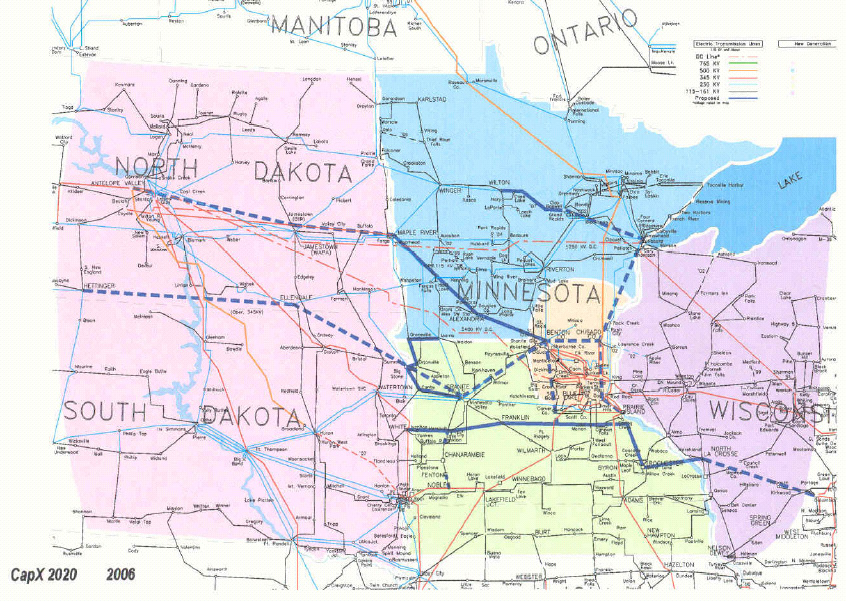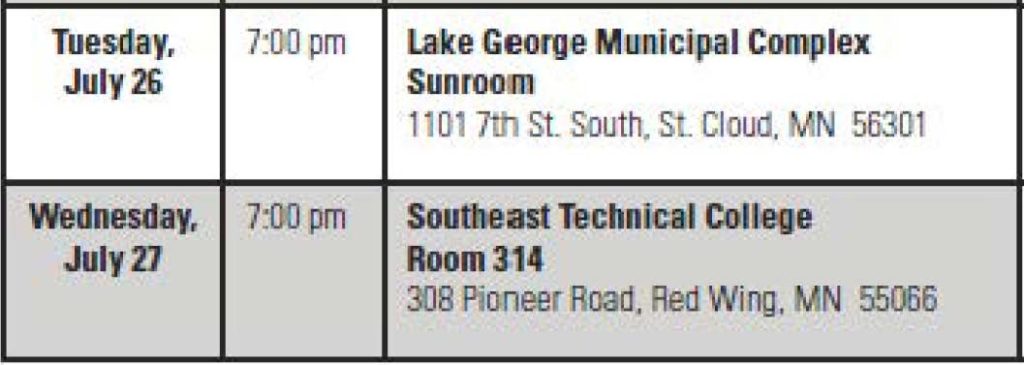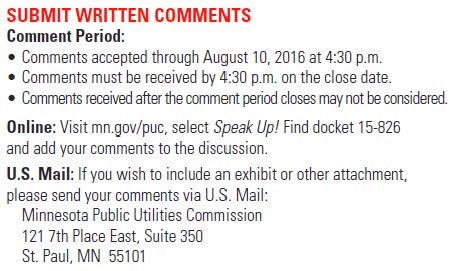Xcel Rate Case in CapX territory

Next week, the Xcel Energy rate case public hearings are in St. Cloud and Red Wing, both in areas hard hit by CapX 2020. Southern Minnesota was also hit with the ITC MN/IA project, which is the northern part of MVP 3, and the Badger-Coulee line from La Crosse to Madison was the northern part of MVP 5. Xcel ratepayers will be hit with a portion of the full MISO MVP 17 project portfolio.
This rate case is driven by Xcel’s desire to recover costs of transmission, that is openly admitted by Xcel Energy, and transmission cost shifting is a part of Xcel’s request. What about the MISO MVP portfolio and what we’re going to pay for that under the FERC approved MISO tariff?
For some odd reason (e21_Initiative “consensus”) the “environmental” and “policy” groups that work hard on turnout for hearings are absent… I guess abdicating on the rate case is part of the consensus, eh? Very few people are turning out for these hearings. And without a strong public outcry, what will happen?

Show up at the hearings! To file written comments, eFile them in PUC docket 15-826 or….

And you should also know that two PUC Commissioners were fundamental in pulling that e21_Initiative and e21 “consensus” together, Matt Schuerger and Nancy Lange. From Mike Bull, who reports on how it began:
So I reached out from Xcel to Rolf Nordstrom at the Great Plains Institute and Nancy Lange then at CEE (now a Minnesota PUC commissioner), to start putting the e21 project together. Rolf and I worked to put a strong core project team together – CEE, Great Plains, Xcel Energy, Minnesota Power, George Washington University Law School and consultant Matt Schuerger.
Time for Nancy Lange and Matt Schuerger to recuse… it’s overdue.
Again, this rate case is transmission driven. At issue in this rate case are considerations of what costs will be foisted on ratepayers, i.e., should Minnesota ratepayers have to pay for transmission THROUGH Minnesota, to points elsewhere, should Xcel ratepayers pay for transmission THROUGH Xcel territory to other service areas, should Xcel ratepayers pay for transmission for market access, for market transactions, which is a private purpose not having anything to do with serving Xcel customers. And Xcel is specifically asking that transmission cost recovery be shifted from current Construction Work in Progress (CWIP) and AFUDC.  Those of you affected by CapX 2020 know the price you’ve already paid, and this rate case is adding insult to injury.
CapX 2020 is specifically named in testimony in this docket, for example, in Ian R. Benson’s testimony, n p. 8, 14-15, 17, 23-30, 39, 55-60, and discussed thoroughly throughout:
And from the Application, these two snippets, and note that the Brookings and Fargo projects are key “Minnesota pass-through” transmission lines — and why these and not the Bemidji-Grand Rapids and/or the Hampton-La Crosse lines?


Here’s the gory details of Lange and Schuerger’s involvement (from e21_MikeBull_Center for Energy and Environment) — as noted above. Schuerger was a conslutant on this, so his involvement is even more damning…
The e21 Initiative started as little more than a glimmer in my eye a couple of years ago, when I was a Manager of Policy and Strategy for Xcel Energy. I’d just come back from a meeting at the Edison Electric Institute about the impact of various dynamics – low load growth, increasing infrastructure investments, deeper penetrations of distributed resources – on the current utility business model. In general, rates were going to rise under the current model far faster as a result of those forces, and utility revenues become more uncertain.
Those dynamics were later chronicled in the Disruptive Challenges report issued by the Edison Electric Institute in January 2013. I realized that it was important for Xcel to try and get out ahead of the curve.
So I reached out from Xcel to Rolf Nordstrom at the Great Plains Institute and Nancy Lange then at CEE (now a Minnesota PUC commissioner), to start putting the e21 project together. Rolf and I worked to put a strong core project team together – CEE, Great Plains, Xcel Energy, Minnesota Power, George Washington University Law School and consultant Matt Schuerger. We then compiled a terrific group of stakeholders who together represent much of what constitutes the public interest – low income customer advocates, small and large business representatives, utilities, environmental organization, cities and other public entities, and regulators. Beginning last February, this group of 25-30 stakeholders met monthly for day-long sessions that were wonderfully facilitated by Rolf and Jennifer Christenson, his colleague at GPI, toiling together deep in the weeds of utility regulation.
It was an honor to work with all of them, as we coalesced around the set of consensus recommendations detailed in the report.
And what about the limited interventions in this matter, regular intervenors being tossed out:
Order Denying Intervention_Sunshare & ILSR
That second denial of Intervention is a little over the top!
In the Certificate of Need CapX proceeding, we were repeatedly told that rate recovery for the transmission projects were only an issue for a rate case, and as above, in the rate case, CapX 2020 is specifically named in testimony in this docket, for example, in Ian R. Benson’s testimony, n p. 8, 14-15, 17, 23-30, 39, 55-60, and discussed thoroughly throughout:
… sigh… and I can’t find that any party has filed testimony regarding CapX 2020 and the MISO MVP 17 project portfolio other than Xcel!!! But maybe that’s also a part of the e21 consensus, eh?

Comments
Xcel Rate Case in CapX territory — No Comments
HTML tags allowed in your comment: <a href="" title=""> <abbr title=""> <acronym title=""> <b> <blockquote cite=""> <cite> <code> <del datetime=""> <em> <i> <q cite=""> <s> <strike> <strong>